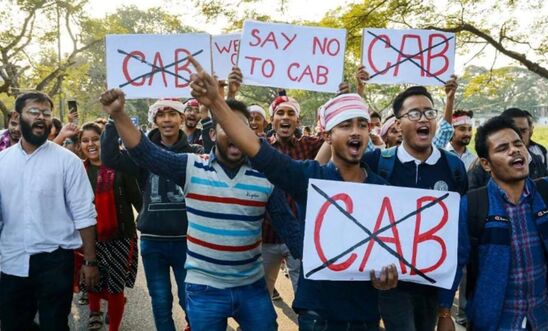
Press releases
India: Delhi police committed multiple human rights abuses during February riots - new briefing

Police in Delhi must be investigated for committing multiple human rights abuses during riots in the Indian state in February, Amnesty International India said in a new briefing published today.
The riots in the north-east district of Delhi between 23-29 February left more than 50 people dead, the majority of whom were Muslims, and injured more than 500. The riots followed protests against the controversial Citizenship Amendment Act.
Based on interviews with more than 50 eyewitnesses, lawyers, doctors, human rights activists and retired police officers, as well as analysis of several key videos, Amnesty’s investigation reveals a disturbing pattern of human rights violations committed by police during the riots. Police officers beat rioters, used excessive force, tortured detainees in custody, and stood by as rioters wreaked havoc.
The briefing documents the build-up to the riots, a timeline of police brutality in university campuses and the impact of speeches made by political leaders, including Kapil Mishra, leader of the Bharatiya Janata Party (BJP).
On 23 February, Kapil Mishra gave police a three-day ultimatum to remove the protesters. His speech was immediately followed by widespread violence. However, no efforts have been made to bring political leaders to justice for the deaths and injuries which followed.
Avinash Kumar, Amnesty International India’s Executive Director, said:
“Six months on, there has not been even a single investigation into the role of the Delhi police. This ongoing state-sponsored impunity sends the message that the law enforcement officials can commit grave human rights violations and evade accountability.
“Amnesty International India calls on the Ministry of Home Affairs to conduct a prompt, thorough, transparent, independent and impartial investigation into all allegations of human rights violations committed by Delhi police and the hate speeches made by political leaders.
“This impunity sends the message to the politicians and police who advocate for violence in their speeches, and fail to prevent the violence that follows, that they can get away with committing grave human rights violations. This impunity needs to, and must, end in order to bring justice to the victims and their family members.”
Police assault caught on camera
Amnesty India visited locations where social media videos had caught police brutality on camera, and interviewed eyewitnesses and survivors.
In one of several videos analysed by Amnesty’s Citizen Evidence Lab, its open-source digital investigation team, Delhi police officers can be seen kicking and hitting a group of five wounded men on 24 February, poking them with rifles, and asking them to sing the Indian National Anthem. The men were then detained by the police.
Amnesty India analysed the footage and interviewed Kismatun, the mother of 26-year-old Faizan, one of the men in the video. Kismatun said she had seen the video several times but did not realise until much later that her son was also there in the video.
She told Amnesty: “I went to the police station along with my son’s photograph. I showed them his photograph and asked if he was there and they said yes. I asked them if they would let me see him and if they would let him go. The policeman said no. I waited there till 1am.”
Faizan was detained by the police for close to 36 hours without any charge. He was handed over to his mother after his condition deteriorated. The police refused to give any paperwork to the family to show that he had been detained.
The ruthless treatment of the heavily injured men by the Delhi police violates international human rights standards that allow for force to be used only as a last resort by law-enforcement officials. It also violates Article 9 of the International Covenant on Civil and Political Rights, to which India is a state party.
To verify the evidence of human rights violations on social media videos, Amnesty India collaborated with Amnesty International’s Citizen Evidence Lab. The Lab uses open-source digital investigation tools to corroborate and analyse serious human rights violations. It authenticated these videos by verifying the time, date and location of the videos.
- Downloads
- Delhi Report